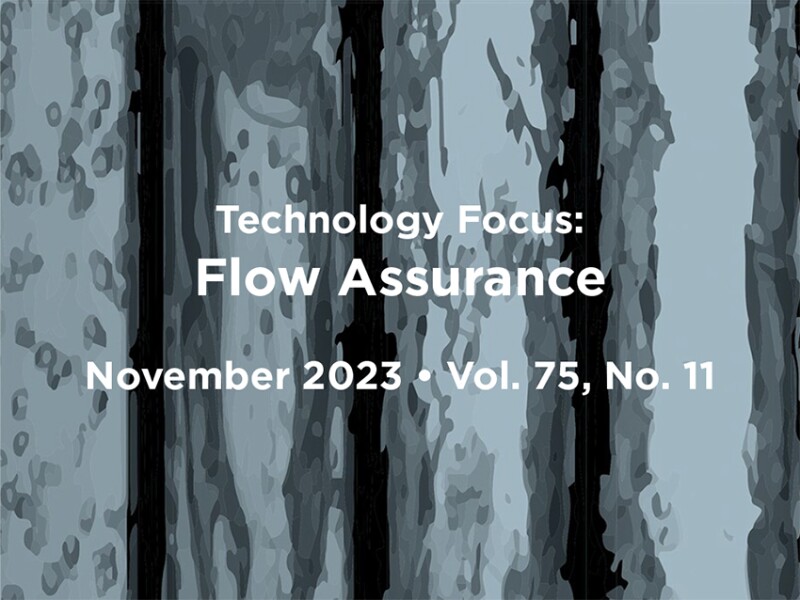This year has seen a focus on gas development projects and the energy transition. Flow assurance plays an interesting role in this area. Even though the attention has been on the energy transition, where gas development is concerned, the production processes through which gas is produced cannot be ignored. Thus, flow-assurance issues remain prevalent today, and an analysis of existing solutions, key to the success of oil and gas producing facilities, needs to be addressed.
Tackling mixed-scale issues in the oil field using a novel robust scale dissolver (RSD) was studied in paper SPE 211187. Scaling, an incompatible-fluids-related flow-assurance problem in oil and gas wells at various locations in the Malaysian basin, results in rapid oil production decline. RSD is said to be capable of dissolving up to 100% of mixed scales in 24 hours at well temperatures with no incompatibility with production chemicals, pumping, and wireline components. This was done under laboratory conditions. A field trial was completed, with outstanding results for the RSD as it proved capable of reviving the well by resolving mixed-scale issues.
Paper SPE 211943 discusses a thermodynamic modeling approach for prediction and prevention of wax deposition. Wax deposition, an oilfield problem prevalent with aging wells, requires a degree of accuracy with prediction to have better control over prevention approaches. The paper discusses the thermodynamic modeling approach used to determine the wax appearance temperature in a well. This tool also confirmed the optimal depth at which to place a wax-inhibition tool based on the life-cycle expectations of the well. This improved well availability by 30%.
Paper OTC 32170 addresses performance mapping of a multiphase-flow model. Exploration-data-analysis techniques were used that enabled a comprehensive analysis of several independent data sets from various origins. The analyses provided actionable and more-general insights that would have been otherwise obscured were individual data sets to be analyzed independently.
These papers addressed prevailing issues critical for success and production optimization. Addressing the dissolution of mixed scale is a pressing need in modern operations without necessarily finding the scales in isolated conditions. Wax remediation relies highly on accurate temperature data for maximum efficiency and cost savings. I highly recommend reading the second highlighted paper to understand how the well availability of 30% was achieved. Data analytics in oil and gas enables actionable insights easily identified by the last reviewed paper.
I trust, with these updates in flow assurance in recent times, we are well placed and assured of production-facility support for the coming years, contributing positively to the goals of the energy transition through fuels such as gas.
This Month’s Technical Papers
Robust Scale Dissolver Mitigates Mixed-Scale Issue in South China Sea
Thermodynamic Modeling Approach Assists Mitigation of Wax Deposition
Experimental Data-Analysis Methods Analyze Multiphase-Flow Data Sets
Recommended Additional Reading
SPE 213817 Multifunctional Flow Assurance Inhibitors: Three Birds With One Stone? by Malcolm A. Kelland, University of Stavanger, et al.
SPE 215003 Significant Reduction of the Viscosity of Waxy Oils by Electrical Treatment by Hao Wang, The University of Texas at Austin, et al.
SPE 213808 Calcite Scale Mitigation in a Very-Low-Water-Cut, Low-Salinity, HP/HT Environment: Lessons Learned in Surveillance, Mitigation, and Scale-Inhibitor Performance Monitoring for an Onshore Field by Jonathan J. Wylde, Heriot-Watt University, et al.

Celestina Yaaba Kissi, SPE, is a chemical engineer based in Accra, Ghana. She started her career as a graduate process engineer with Ghana’s Tema Oil Refinery for her National Service. Kissi then moved on to Shell Ghana as a graduate trainee, working on fuel scheduling on the downstream side of the industry. While there, she had the opportunity to work offshore as a chemist on a rotational basis with Baker Hughes. Kissi has more than 8 years of experience as an offshore chemist and a total of 15 years of experience in the oil and gas industry. She is currently an offshore chemist with ChampionX in Ghana. Kissi has been a member of SPE since 2011, and she was the young professionals chairwoman from 2017 to 2018 and section chairwoman from 2019 to 2022. Kissi is currently a member of the Diversity and Inclusion Committee in Ghana, a section director, an SPEI Awards Committee member, and a member of the JPT Editorial Review Board. She can be reached at CelestinaYaaba.kissi@gmail.com.

